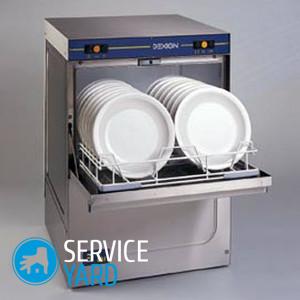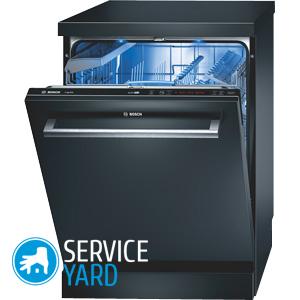Error codes for Bosch dishwashers
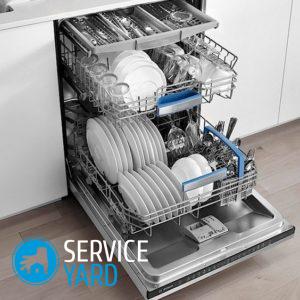
Unfortunately, sometimes it happens that your favorite dishwasher malfunctions: it drains water, gives a leak, and even does not turn on at all. Not all faults require the services of a professional craftsman. Sometimes you can deal with them yourself. Error codes for Bosch dishwashers will help you deal with the cause of breakdowns, and in some cases, eliminate them yourself.
to contents ↑What could be causing the malfunction?
If the dishwasher has served you for more than 5-6 years, then it is likely that the malfunction is caused by the natural physical deterioration of components. If the dishwasher equipment is relatively new, then the following situations can cause breakdown and errors that occur in the dishwasher:
- Poor assembly, defective components. This is especially common in products from little-known manufacturers and inexpensive models made in China. Bosch brand technology in this regard practically does not fail.
- Loading heavily soiled dishes into the chamber. Food debris contributes to fast clogging of the filter. In addition, if the dishes are very dirty, the machine does not wash them well and you have to rinse the dishes additionally manually.
- Defective outlet.
- Errors made when connecting the dishwasher, for example, a drain hose that is too long or a hose with a cold water is loose.
- Use of low-quality detergent that does not wash dishes well.
- Loose door closure. The machine turns on only after the latches are activated. If the door does not hold by itself, this cannot be considered a breakdown. This is a factory marriage.
- Incorrect loading of dishes, as a result of which it is washed unevenly. Before loading the dishes, carefully read the instructions. Cups and plates are loaded into the upper part, and larger-sized kitchen utensils, for example, pots, are loaded into the lower part.
to contents ↑Important! When loading dishwashers, make sure that glasses and cups are only installed upside down. Be sure to read our set of useful tips and rules, how to arrange dishes in the dishwasher.
Dishwasher malfunctions: basic troubleshooting algorithm
You set the dishwashing mode, the indicators light up, the process of supplying and heating water occurs, but your main function is to wash the dishes, the machine refuses to perform. The causes of this dishwasher malfunction are as follows:
- Filter clogged. It is located at the bottom of the dish loading chamber. To fix this problem is simple: remove the filter, rinse it and reinstall it.
- Clogged nozzles. “Dishwasher” does not spray water. With an ordinary toothpick or other improvised means with the help of our tips, you can quickly clean the dishwasher. A clogged nozzle can also cause low pressure, resulting in poorly washed dishes. Sometimes, if the beam does not rotate, the problem may be a malfunction of the circulation pump.
- A breakdown of the circulation pump supplying water to the nozzles is a rather serious breakdown, which manifests itself in the fact that the machine stops collecting water.There is only one way out: replace the faulty circulation pump with a working one.
Important! It is possible to determine the breakdown of the pump by a characteristic sound. If there is no noise after water intake, then most likely the problem is in it.
In this case, the cause of the malfunction of the dishwashers may be damage to the winding of the electric motor. You can check the integrity of the windings by checking the inter-turn circuit with a multimeter.
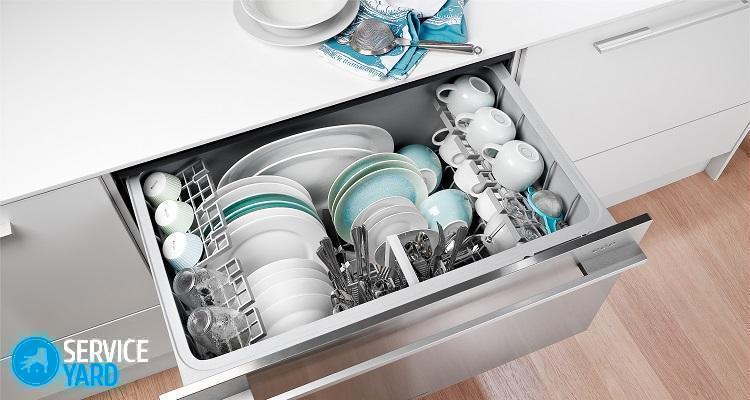
Water overflows
Most likely, the problem is you failure of the water level sensor. It is possible to fix the problem by replacing the sensor with a new one. If the machine is turned off and water is supplied to the chamber, the problem is in the solenoid valve, which prevents the flow of water. Replacing the valve with a worker does not cause any difficulties.
Underheating (overheating) of water
It often happens that the machine heats the water too much, or vice versa - it warms it up. The cause of overheating is a breakdown of the temperature sensor, which leads to increased vaporization and breakdown of equipment.
Reasons for underheating may be as follows:
- Damage to the temperature sensor.
- Low water pressure - with a problem with nozzles or a pump.
- Malfunction of the heater - you can check by measuring the resistance with a multimeter).
Important! To prevent problems with the heater less often, use high-quality ones checked by many housewives dishwasher detergents.
No draining water
If the water does not drain into the sewer, the cause of the Bosch dishwasher error may be a pump breakdown or a clogged drain system. Sometimes dishwasher does not completely drain the water. Most likely, the reason is that the drain hose is excessively high and, after turning off the pump, part of the water flows back into the chamber.
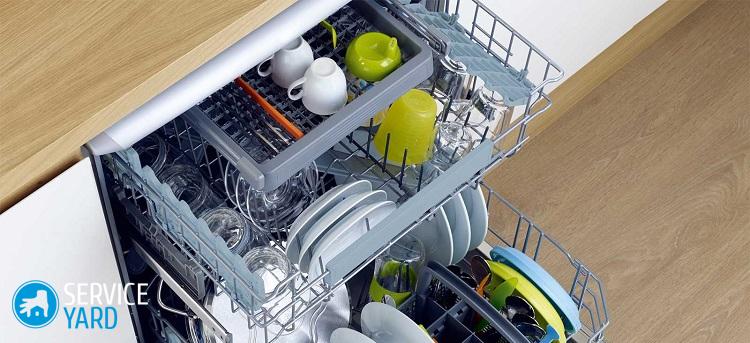
The case is shocking
With a probability of 99%, we can say that a breakdown of the heating element occurred. To verify this, you need to open the heater and carefully examine it. If there is damage, the heating element is replaced with a new one.
Important! A common cause of failure of the heating element is too hard water. To mitigate it, it makes sense to put special water filters.
No detergent intake
If the dishwasher does not pick up the washing tablet or powder, the cause of the problem is most often due to low water pressure or clogged nozzles. As a result, water does not flow into the dispenser.
Important! Sometimes, if the valve is broken (the water intake does not open), the tablet does not completely dissolve, and the dishes are poorly washed.
No power
Errors of Bosch dishwashers are manifested in the fact that the equipment does not turn on, does not respond at the touch of a button. The causes of the malfunction may be the following:
- The outlet is out of order.
- The lockout burned out.
- The door is not closed.
- The network button is broken.
- Faulty line filter.
Important! In order to correctly “make a diagnosis”, it is necessary to check with a multimeter all the links of the electric circuit - this will allow you to find a breakdown by the method of exclusion.
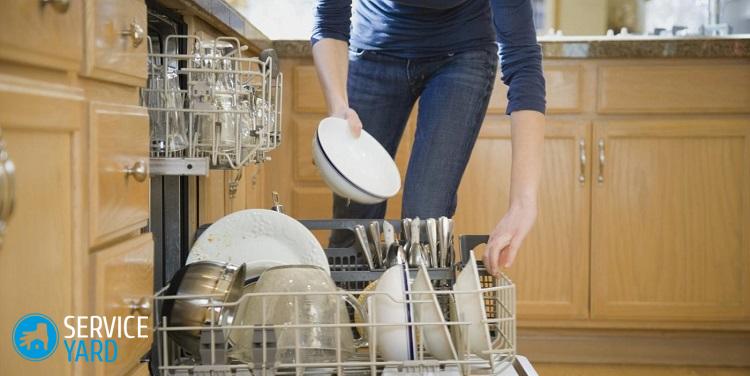
Extraneous noise
The presence of extraneous noise indicates damage to the bearings of the motor or pump. Most often, bearings fail due to wetting with water. Water seeps into the bearings due to damage to the seal. As a result, the equipment begins to make a lot of noise in the process.
To completely eliminate the malfunctions of dishwashers, you will need to replace not only the bearing, but also the oil seal.
Important! Too loud operation of the “dishwasher” can also be caused by damage to the pump impeller, from getting debris to the impeller.
Drying does not work
Some models of dishwasher equipped with the function of drying the washed dishes. Drying is carried out using a fan, which is installed inside the chamber. If the drying does not work, while the technician performs all the other functions normally, then the problem is with the fan.
To verify this, you need to check the supply contacts and windings with a multimeter. If necessary, replace the broken fan with a working one.
Water flows to the floor
This is one of the most common breakdowns of dishwashing equipment. There can be several reasons for the flow of water under the housing:
- Poor condition of door seals. Perhaps they need to be replaced or cleaned of plaque.
- Damaged pump seal. The way out is to replace it with a new one.
- The clamps on the water supply and drain hoses are not tightened enough, there are no seals on the pipe connections.
- Damaged water tank. Most often, it cannot be repaired; the tank is replaced with a new one.
Important! To correctly determine the place of water leakage, the casing of the machine is removed, and the floor is covered with newspapers. Breakage is on the side where the paper gets wet.
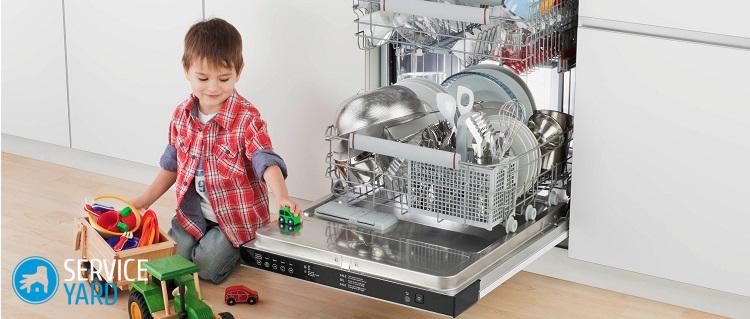
Error codes for dishwashers Bosch, Siemens, Neff, Gaggenau
Bosch dishwashers are equipped with self-diagnosis systems. The owner does not encounter them until mysterious letters with numbers appear on the display. What are they pointing to? Here is a brief description based on which error codes your Bosch or other brand names show your appliances:
- E1. There are problems with heating. It is likely that the heater or the electronic module responsible for its operation is faulty.
- E2. A malfunction in the temperature sensor located in the same unit with the heating element.
- E3. Problems with water intake. The cause must be sought in the malfunction of the pump, hose or intake filter.
- E4. Flow switch clogged or engine burned out.
- E5. Exceeding the level of filling with water in comparison with the permissible. A problem may occur due to a malfunction in the pressure switch or inlet valve.
- E6. Defective aquasensor - a device that monitors the hardness and degree of contamination of water.
- E8. Insufficient water level in the sump, water self-draining. Often the reason for this phenomenon is the insufficiently strong pressure of water in the water supply system, and the dishwasher cannot be used.
- E9. Defective heater. You may have to change it.
- E11. Problems with the module and NTC sensor, power wires.
- E14. The flow sensor does not receive control pulses.
- E15. Aquastop triggered due to water leakage. The specific cause of the leak will be determined by a specialist.
- E16. This Bosch dishwasher error indicates an unintended water intake. There may be problems with the level sensor, intake valve. Sometimes an error is issued in connection with increased foaming.
- E17. Problems with draining water.
- E21. Malfunction of the drain pump due to natural wear or the ingress of a foreign object into it.
- E24. Water does not drain, which can be caused by squeezing the hose.
- E27. Undervoltage in the network. The problem can be solved by installing a stabilizer.
Stock footage
Knowing the codes of the main problems will allow you to either quickly fix them yourself, or promptly call a specialist. So - the likelihood of further proper operation of such valuable household appliances is much higher.




